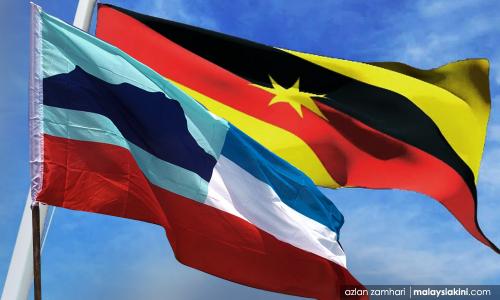LETTER | Attacking the writer and not the contents
LETTER |A friend just mailed me on the following the letter published in Malaysiakini. It's a personal attack on the article below that I wrote as part of my Sabah state polls-related articles.
The title of my article is "Is Malaysia heading for 'BorneoExit'? Why some in East Malaysia are advocating for secession".
My reply:
1) If the writers are unhappy, should they not write to the source of the publication? Why write to Malaysiakini when the article did not appear in Malaysiakini?
2) They accused me of being biased. And I quote: "…provided an impression that as if all Sabahans intend to leave the Federation of Malaysia. He delivered an utterly biased report displaying as if Malayans, or West Malaysians, in particular, are outright racists against Sabahans by imposing Malay-Muslim way of life on their compatriots in Borneo. This accusation is highly untrue."
These are strong words from academics. But it is a hollow accusation given that they did not even read the headline which states clearly that "why some in..." The word "some" some does NOT mean "all Sabahans".
3) The letter then states "...Chin 'jokingly' described that all mega infrastructures in West Malaysian states like the Petronas Twin Towers and the Penang Bridges are funded by resources 'plundered' from Sabah and Sarawak."
The writers are trying to portray me as the source of these statements and unhappiness. I am merely quoting from my research of more than three decades in the Borneo states.
I can, of course, go on and on, but that would be useless. These "academics" obviously do not understand the basics of academic debate and thus choose to attack the writer rather than the content, research findings and ideas.
If I am wrong in my assessment, why bother to attack me? Why not attack what I wrote?
This is one of the fundamental problems in Malaysian academia (and politics). People cannot separate professional opinions from personal ones.
People from Sabah (and Sarawak) will ultimately decide if there is some truth in my research.
The last time I looked, I was on the top ten of Malaysianists whose work is cited.
One should, of course, thank these two "lecturers" for "highlighting" my work.
Prior to this letter, readers of Malaysiakini were probably not aware of this article (I am truly surprised that Malaysiakini would publish a letter about another publication).
Now I will get additional readers- and academics always want their work to be read!
JAMES CHIN is director, Asia Institute, University of Tasmania.
The views expressed here are those of the author/contributor and do not necessarily represent the views of Malaysiakini.
RM12.50 / month
- Unlimited access to award-winning journalism
- Comment and share your opinions on all our articles
- Gift interesting stories to your friends
- Tax deductable
